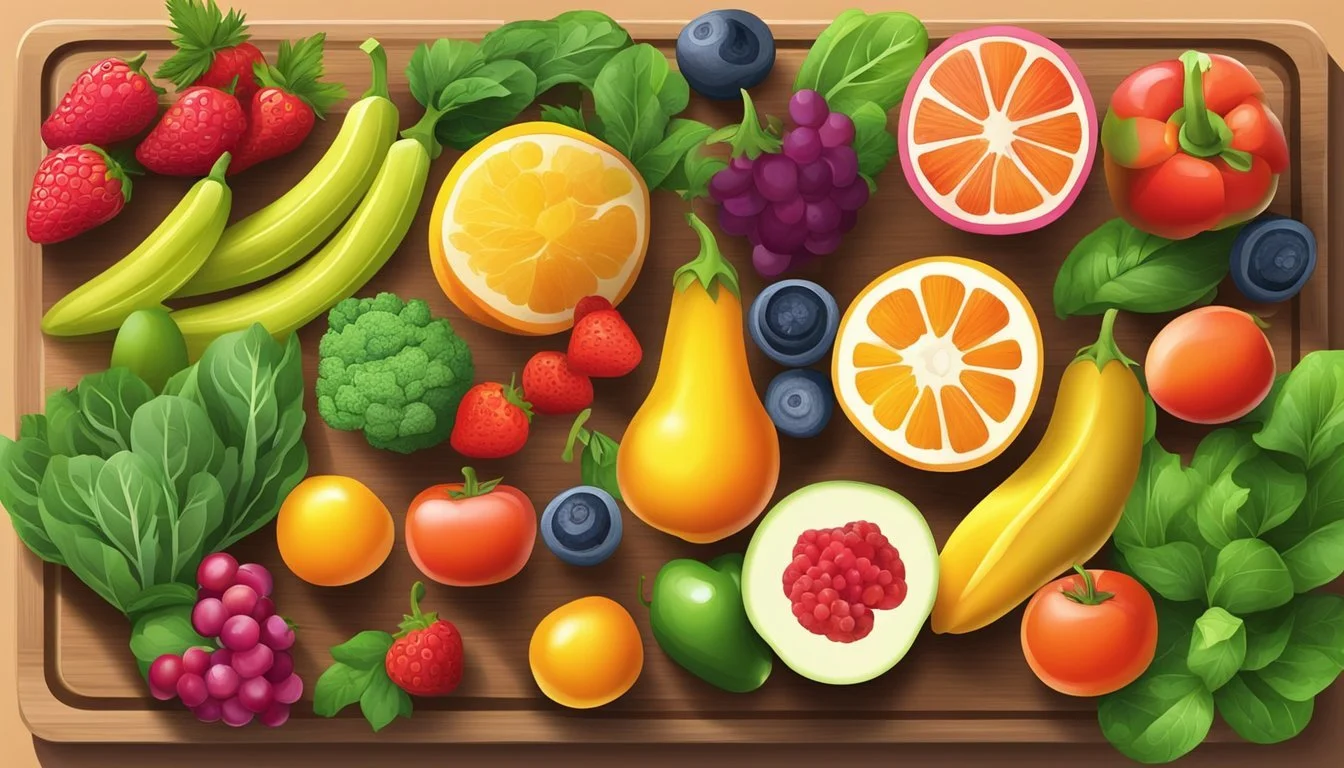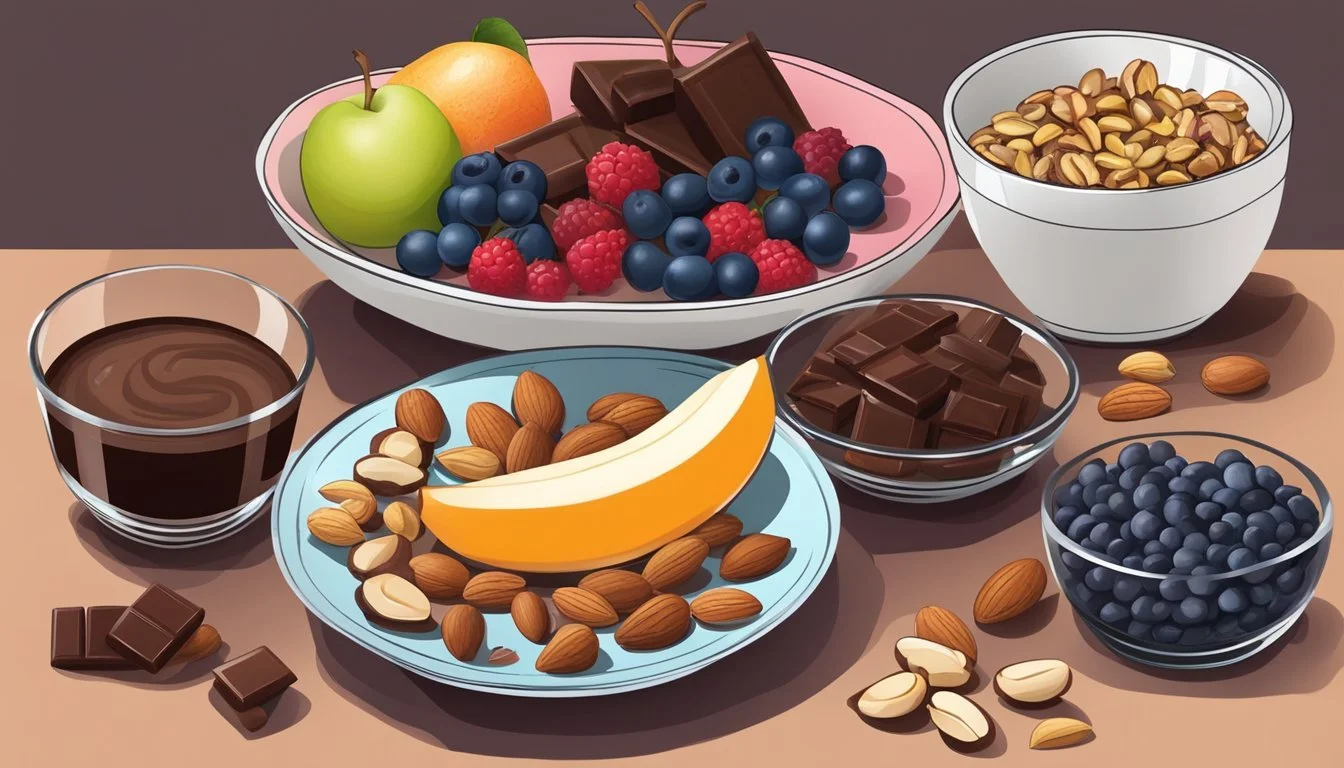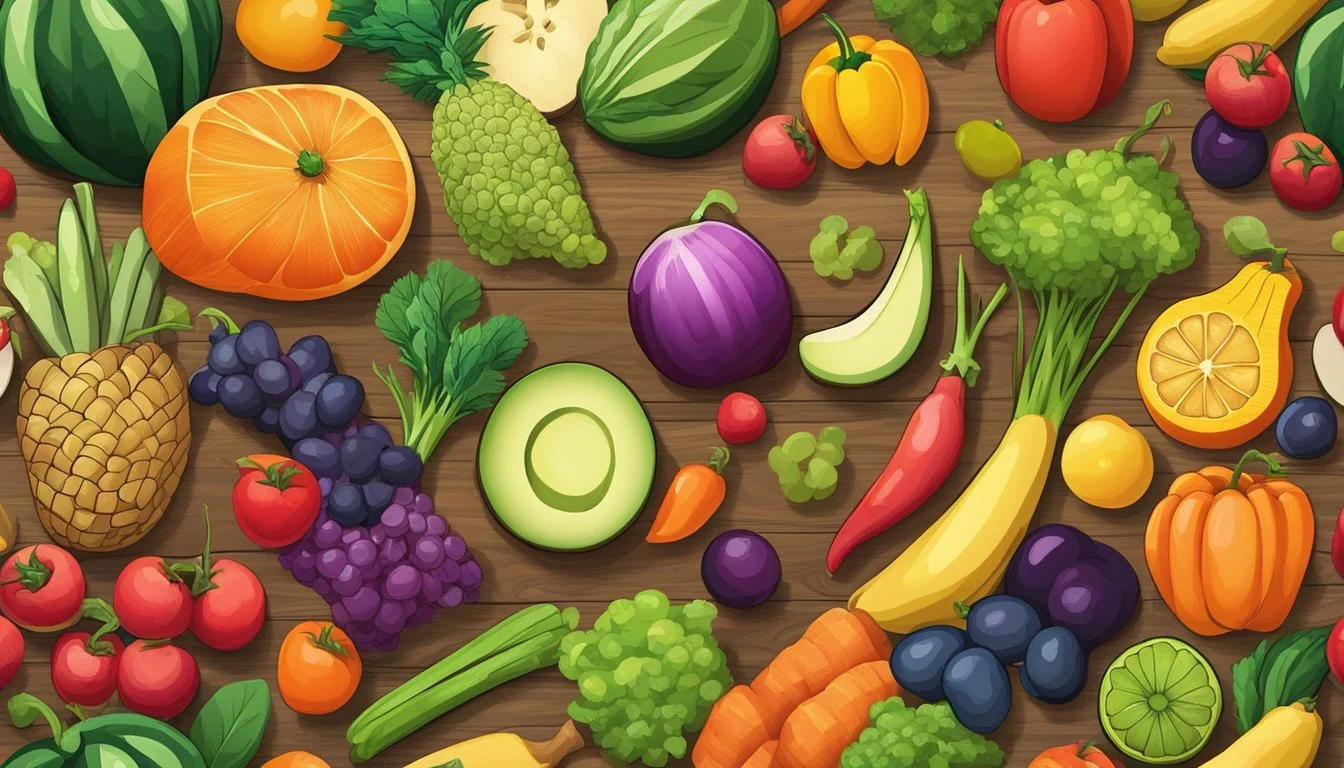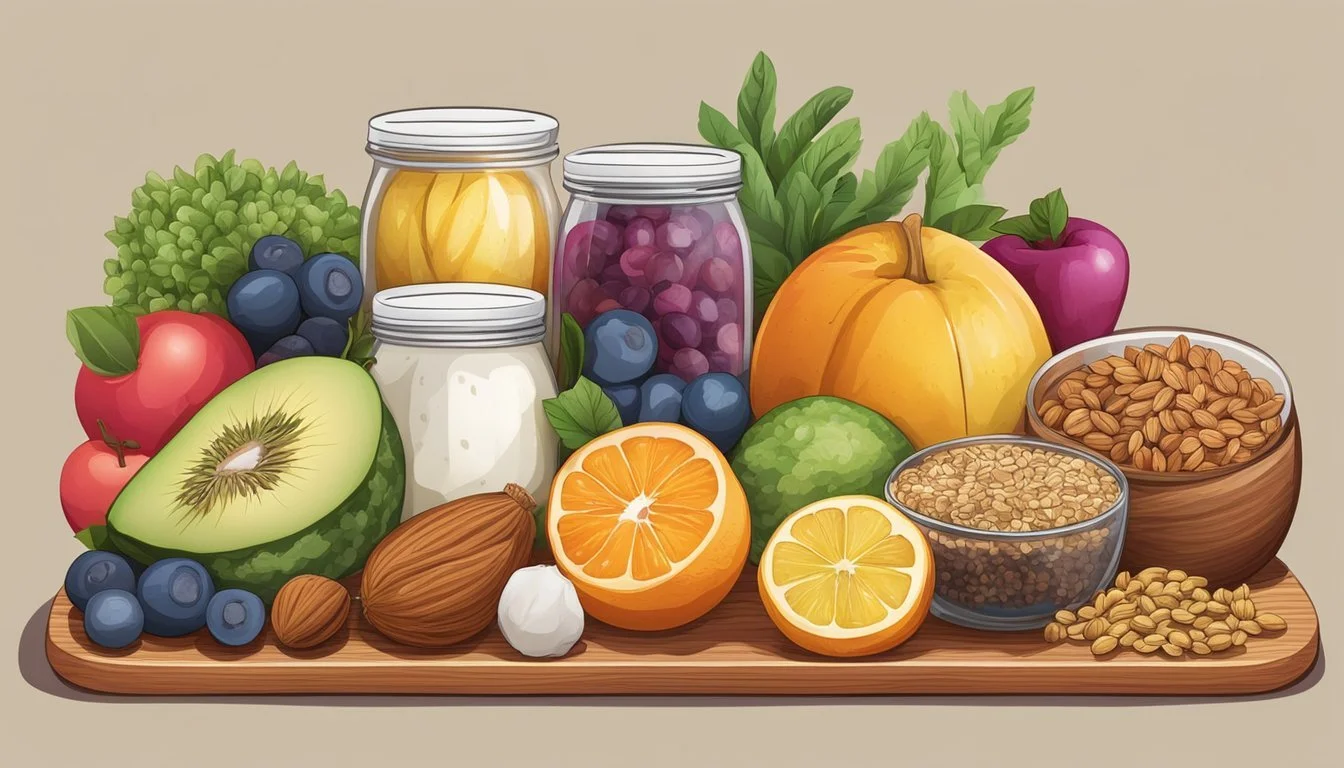Best Foods for a Healthy Antioxidant-Rich Snack
Energizing Options for Your Daily Diet
Antioxidants play a critical role in maintaining the body's wellbeing by combatting oxidative stress, a condition triggered by an imbalance of free radicals and antioxidants. Free radicals, naturally occurring in the body due to processes such as metabolism, can cause cellular damage if left unchecked. A diet rich in antioxidants helps to neutralize these free radicals, supporting overall health and reducing the risk of certain diseases.
Snacking on foods that are high in antioxidants not only provides the body with essential nutrients but also offers a convenient way to increase one's antioxidant intake. These nutrient-dense snacks can include a variety of fruits, vegetables, and legumes. For instance, berries such as blueberries are praised for their high antioxidant content, while leafy greens like kale contribute vitamins A, K, and C along with calcium, attributing to their antioxidant capacity.
Selecting the right foods is crucial, and one can find potent sources of antioxidants in everyday items. Kidney beans, for example, offer antioxidants in addition to protein and heart-healthy fiber. Similarly, other foods like colorful vegetables, certain types of grapes, and nuts are excellent snack choices for those looking to enhance their diet with antioxidant-rich options. Incorporating these foods into one's diet can help in supporting the body's defense system against oxidative stress while providing nutritious and satisfying snack options.
Understanding Antioxidants and Their Benefits
Antioxidants are essential in protecting the body against cellular damage by counterbalancing oxidative stress caused by free radicals. Incorporating a variety of antioxidant-rich foods into one's diet is linked with numerous health benefits.
Role of Antioxidants in Combating Oxidative Stress
Oxidative stress occurs when there's an imbalance between free radicals and antioxidants in the body. Free radicals are unstable molecules that can damage cells, contributing to aging and diseases such as cancer and heart disease. Antioxidants mitigate this threat by neutralizing free radicals, thus protecting cells from damage.
Impact of a Diet Rich in Antioxidants on Health
A diet abundant in antioxidants is associated with a lower risk of chronic diseases. These compounds help reduce inflammation, bolster the immune system, and may lower the risk of certain cancers. Moreover, antioxidants are crucial for maintaining brain function and skin health, potentially slowing aspects of the aging process.
Key Antioxidant Nutrients and Their Sources
Antioxidants encompass a range of vitamins and minerals, including:
Vitamin C: Found in citrus fruits, bell peppers, and strawberries.
Vitamin E: Present in sunflower seeds, almonds, and leafy greens.
Beta-carotene (a form of Vitamin A): Available in carrots, sweet potatoes, and spinach (What wine goes well with spinach?).
Selenium: Meats, nuts, and seafood are common sources.
Flavonoids and polyphenols: Abundant in tea, chocolate, and berries.
Carotenoids: Present in tomatoes, kale, and oranges.
These nutrients can occur in single foods or as part of a complex food matrix.
Antioxidant Foods vs. Supplements
There is ongoing debate regarding the efficacy of antioxidants from foods versus supplements. While supplements can help individuals meet their antioxidant needs, many experts and dietitians recommend obtaining these nutrients primarily through a varied diet. This is because antioxidant-rich foods often contain a complex mix of nutrients that work together to support health, beyond what can be captured in a supplement.
Antioxidant-Rich Snacks
Incorporating antioxidant-rich foods into snacks is an effective way to boost overall nutrient intake, including fiber and essential vitamins. These snacks not only offer health benefits but also satisfy cravings with their vibrant flavors and textures.
Fruits as Snacks: Berries and Beyond
Berries, with their high antioxidant content, make for excellent snacks. Blueberries, for instance, boast an impressive antioxidant score, contributing to cellular health. A 2/3 cup serving or 100 grams of blueberries provides around 9.2 mmol of antioxidants. Strawberries and raspberries also pack a nutritious punch with vitamin C and manganese. Both nutrients have antioxidant properties which support immune function and bone health. Similarly, black raspberries stand out for their anti-inflammatory and antioxidant effects.
Apples: Rich in fiber and vitamin C, apples are a convenient on-the-go snack option that provide a sweet or tart taste and beneficial phytonutrients.
Vegetables as Snacks: Crunchy and Satisfying
For a crunchy option, vegetables such as kale, spinach, and different varieties of cabbage, including red and purple cabbage, are excellent choices. These vegetables are dense in nutrients and low in calories, which makes them ideal for snacking.
Brussels sprouts and carrots add texture and antioxidants in the form of vitamin A, supporting eye health.
Beets are notable for their betalains, pigments with antioxidant properties that may support inflammation reduction.
Nuts and Seeds: Nutrient-Dense Bites
Nuts and seeds, while small, are mighty when it comes to their nutrient profile. Snacking on pecans, walnuts, and almonds provides a dose of healthy fats, protein, and fiber. Pecans, for instance, contain antioxidants that help fight free radicals. Chia seeds offer a boost of omega-3 fatty acids and can be incorporated into yogurt or smoothies for a texture-rich snack.
Pecans: A serving can offer a substantial amount of antioxidants, along with a satisfying crunch.
Recipes and Combinations for Delicious Snacking
Creating delightful snack recipes that combine these antioxidant-rich foods can elevate the snack experience. A mixed berry salad incorporating blueberries, strawberries, and raspberries can satisfy a sweet tooth. For a savory twist, kale or spinach can be lightly tossed with olive oil and baked to create nutrient-dense chips. Roasted nuts, perhaps tossed with a pinch of sea salt or spices, provide a satisfying crunch and robust flavor profile.
Mixing nuts and berries or adding a sprinkle of chia seeds to a fruit bowl can also add varying textures and flavors, while amplifying the nutrient content of a snack.
Specific Antioxidant Compounds in Snacks
Antioxidants play a crucial role in maintaining health by combating oxidative stress which can damage cells and lead to chronic diseases. This section describes specific types of antioxidant compounds found in snack foods and their health benefits.
Flavonoids and Their Effects
Flavonoids are a diverse group of plant compounds known for their potent antioxidant properties. Two important flavonoids are kaempferol and quercetin, which are found in various fruits and vegetables. These compounds have been associated with a lower risk of certain cancers and may contribute to heart disease prevention.
Kaempferol: Found in apples, grapes, and other plant-based foods.
Quercetin: Abundant in onions, berries, and leafy greens.
Carotenoids: Colors of Health
Carotenoids, responsible for the vibrant hues of many fruits and vegetables, offer substantial health benefits due to their antioxidant action. Beta-carotene, lutein, and zeaxanthin are carotenoids that support eye health and may reduce the risk of certain cancers.
Beta-carotene: Present in carrots, sweet potatoes, and squash.
Lutein and Zeaxanthin: Concentrated in leafy greens like spinach and kale.
Understanding Anthocyanins in Berries
Berries, such as blueberries and black raspberries, are rich in anthocyanins, antioxidants that give berries their characteristic red, blue, or purple colors. Anthocyanins have been linked to enhancement in heart health and might play a role in cancer prevention.
Blueberries: Known for high anthocyanin content.
Raspberries and Black Raspberries: Provide significant amounts of anthocyanins and other antioxidants.
Health Considerations for Snacking
When selecting snacks, it is essential to consider both the impact on blood sugar levels and antioxidant intake to maintain overall health.
Balancing Blood Sugar and Antioxidant Intake
To manage blood sugar and prevent type 2 diabetes, snacks with a low glycemic index that balance carbohydrates with protein and fiber are preferred. Antioxidants in these foods help combat oxidative stress, a factor in diabetes and other chronic conditions. Options like apple slices with almond butter, rich in antioxidants, provide a crisp, sweet, and filling choice without spiking blood sugar levels.
Smart Snacking for Heart and Brain Health
Foods that contain antioxidants, omega-3 fatty acids, and fiber can support both heart and brain health. Snacks like walnuts or a red bell pepper with guacamole not only offer antioxidants but also contain healthy fats and fiber that contribute to lower LDL cholesterol and blood pressure, reducing the risk of cardiovascular disease. These nutrients, along with antioxidants, may also play a role in preventing age-related macular degeneration and support overall brain health.
Antioxidants and Chronic Conditions
Regular consumption of antioxidant-rich foods can help mitigate inflammation and free radical damage, which are contributors to a plethora of chronic diseases including certain cancers and chronic diseases such as cardiovascular disease and macular degeneration. Including snacks like dark chocolate with chia seeds and nuts or roasted edamame can help increase antioxidant intake, and potentially, reduce the risk of chronic conditions.
Additional Antioxidant-Rich Foods and Spices
Beyond fruits and vegetables, one's diet can be enhanced with a variety of beverages, sweets, and spices that are known to have high levels of antioxidants. These can contribute to increasing blood antioxidant levels and providing health benefits.
Beneficial Beverages: Tea and Coffee
Tea: Rich in flavonoids, both green and black teas are excellent for boosting antioxidant intake.
Coffee: A popular beverage that, in moderation, can contribute to an increase in blood antioxidant levels due to its high polyphenol content.
Dark Chocolate and Cocoa: Indulgent Antioxidants
Dark Chocolate: With a cocoa content typically above 70%, it's not only a treat but also a source of antioxidants.
Cocoa: Pure unsweetened cocoa powder contains flavonoids that may contribute to cardiovascular health.
Spices: More Than Just Flavor
Turmeric: Contains curcumin, a compound with strong antioxidant properties.
Cinnamon: Apart from its sweet, warm taste, it offers antioxidants that can help in reducing inflammation.
Rosemary: Not only for aromatic dishes, rosemary also has compounds like rosmarinic acid with antioxidant effects.
Recommendations from Experts
Experts in nutrition highlight antioxidants as essential combatants against free radicals, which are known contributors to aging and various diseases. A dietitian can provide tailored advice on incorporating antioxidant-rich snacks into a well-rounded diet to promote health.
Dietitian's Advice for Inclusion in a Balanced Diet
Antioxidants are pivotal for neutralizing free radicals in the body, thereby potentially reducing the risk of chronic diseases and slowing down the aging process. Dietitians recommend a variety of foods for their snack-time antioxidant properties.
Berries: Topping the list for their potent antioxidant content are berries like blueberries, which contain 9.2 mmol of antioxidants per 100 grams.
Fruits and Vegetables: Dietitians suggest pairing cottage cheese, a protein and calcium-rich food, with fruits or vegetables to create a balanced snack.
Nuts and Seeds: Adding chia seeds, almonds, or walnuts to your snack can provide an extra antioxidant boost. For example, pairing thinly sliced apples with cinnamon and almond butter is both nutritious and delicious.
Legumes: Roasted edamame is known as a gut-friendly snack due to its high protein and fiber content, also supporting the diet with antioxidants.
Here is a table summarizing some of the dietitian-recommended, antioxidant-rich snacks:
Food Item Antioxidant Content Additional Nutritional Benefits Blueberries 9.2 mmol per 100 g High in vitamins, fiber Cottage Cheese with Fruits/Vegetables High in protein; good calcium source B vitamins, selenium Nuts like Almonds and Walnuts Varied; nuts are generally high in antioxidants Heart-healthy fats, protein Roasted Edamame Fiber: 8 g per cup Protein: 18.4 g per cup
Inclusion of these snacks into one's diet can bolster the body's defenses against oxidative stress and contribute to long-term health. It's important to measure intake based on individual dietary needs and consider the full day's consumption to maintain balance.
Additional Nutrients in Antioxidant-Rich Snacks
Antioxidant-rich snacks offer more than just disease-fighting compounds; they come packed with a range of vital nutrients that contribute to overall health.
Understanding the Importance of Vitamins and Minerals
Antioxidant-rich foods typically contain a variety of vitamins and minerals that are essential for maintaining health. For instance, vitamin C is not only a potent antioxidant but also contributes to immune defense and skin health. Vitamin E serves as a fat-soluble antioxidant, protecting cell membranes from oxidative damage. Additionally, minerals like manganese play a role in metabolic processes and are commonly found in high levels in foods such as berries and seeds.
Fiber and Protein: Essential Components of Snacks
Beyond their vitamin and mineral content, many antioxidant-snacks are also a good source of fiber and protein. Fiber is crucial for digestive health and can help regulate blood sugar levels. For example, raspberries are high in fiber, which aids in satiety and may help in weight management. Protein provides the building blocks for repair and growth in the body and is an important component for a satisfying snack. Nuts and seeds, while high in antioxidants, also provide a healthy dose of protein.
Identifying High-Potassium Snacks for Blood Pressure Management
Foods that are high in antioxidants and rich in potassium can support blood pressure management. Potassium helps to balance the effects of sodium and can aid in relaxing blood vessels, effectively lowering high blood pressure. Antioxidant-rich snacks like bananas, oranges, and spinach, are excellent sources of potassium and should be considered as part of a diet aimed at blood pressure management.
Closing Thoughts
In navigating the maze of nutrition advice, one encounters the term antioxidants frequently. These potent compounds play a crucial role in protecting the body from oxidative damage caused by free radicals. Free radicals are unstable molecules that can harm cells, leading to chronic diseases and aging.
Incorporating antioxidant-rich foods into one’s diet is a practical strategy to bolster the body's defenses. Berries, such as blueberries and strawberries, have emerged as champions in terms of their antioxidant content. They offer a delicious snack option while conferring health benefits.
Kidney beans also provide a substantial antioxidant boost along with protein and fiber, contributing to a more satiating snack. For those seeking a leafy option, kale supplies antioxidants, alongside essential vitamins and minerals.
A balanced diet should include a variety of these foods to ensure a wide range of antioxidants. This approach not only counters free radicals but also supports overall health through varied nutrient intake.
Opting for antioxidant-rich foods as snacks is both a delightful and strategic choice that supports long-term well-being. It’s a confident step toward embracing a lifestyle that values nutrient-dense eating as a pillar of health maintenance.
Antioxidant Sources Noteworthy Nutrients Berries Vitamins, Fiber Kidney Beans Protein, Manganese Kale Vitamins A, K, and C
By choosing wisely, individuals can enjoy tasty snacks that are as nourishing as they are enjoyable.
Appendix: Snack Recipes and Ideas
The following subsections present snack recipes and ideas that are rich in antioxidants, tailored for various lifestyles and preferences. These recipes incorporate a range of antioxidant-packed ingredients for anyone looking to enrich their diet with healthful snacks.
Creative Combinations for Meal Prep
For those who meal prep, integrating antioxidant-rich foods into snacks can elevate both nutrition and flavor. A standout option is a Quinoa and Berry Salad which blends cooked quinoa, mixed berries (such as blueberries and raspberries), chopped nuts, and a drizzle of honey for natural sweetness. Another preparation could involve making a batch of Antioxidant Trail Mix, combining raw almonds, walnuts, dark chocolate bits, and dried cherries or goji berries for a portable snack.
Desserts with Antioxidant Benefits
Desserts can be nutritious without compromising on taste. A Dark Chocolate Avocado Mousse takes advantage of avocado's healthy fats and cocoa's antioxidant properties. Simply blend ripe avocados, high-quality cocoa powder, a touch of maple syrup, and a pinch of sea salt until smooth. For a fruitier dessert, a Berry Crisp with a crumbly oat topping can be made using fresh mixed berries and a sprinkle of cinnamon for added flavor complexity.
Quick and Easy Antioxidant Snacks for Busy Lifestyles
Busy individuals need snacks that are straightforward and time-efficient. A quick snack might be homemade Kale Chips, baked with a drizzle of olive oil and a sprinkle of sea salt. For an on-the-go option, pre-packed Antioxidant Snack Packs containing a small serving of raw nuts, dark chocolate pieces, and dried blueberries offer a convenient boost. Whole fruit, like an apple or a handful of strawberries, also serves as a quick antioxidant-rich snack that requires minimal preparation.
FAQs on Antioxidants and Healthy Snacking
What are antioxidants?
Antioxidants are molecules that help neutralize free radicals in the body. Free radicals are unstable atoms that can damage cells, leading to aging and illnesses.
Why are antioxidants important in snacking?
Incorporating antioxidant-rich foods into snacks contributes to the overall intake of these beneficial nutrients throughout the day, supporting cellular health and reducing the risk of chronic diseases.
Which snacks are high in antioxidants?
Snack Antioxidant Compounds Berries Vitamin C, flavonoids Dark Chocolate Polyphenols, flavanols Nuts Vitamin E, selenium Chickpeas Isoflavones, phytic acid Spinach-based dips Lutein, beta-carotene
Berries, such as blueberries and raspberries, are excellent sources. Dark chocolate is another tasty option, but it's best consumed in moderation. Nuts offer a crunchy, satisfying snack with a good antioxidant profile. Chickpeas can be enjoyed as hummus or roasted. Spinach-based dips also offer a vegetable-based antioxidant boost.
How do antioxidants help fight free radicals?
Antioxidants donate electrons to free radicals without becoming destabilized themselves. This action halts the chain reactions that can lead to cellular damage.
Can snacking on antioxidant-rich foods improve health?
While no snack is a magic bullet for health, choosing snacks packed with antioxidants can contribute to a diet that supports long-term well-being. They should complement a balanced diet and healthy lifestyle.
Remember, healthy snacking should be part of a varied and balanced diet. Always consult a healthcare provider or a registered dietitian for personalized nutritional advice.
References
EatingWell Magazine
They highlight blueberries as one of the highest common berries in antioxidant content, measuring at 9.2 mmol per 100 g.Health Publication
They discuss pulses such as beans, lentils, peas, and chickpeas, noting their high antioxidant levels, including polyphenols and flavonoids, and their health benefits like anti-inflammatory and anti-tumor properties.Medical News Today
An assortment of antioxidant-rich foods is considered, including purple or red grapes, spinach, beets, kale, and orange vegetables, emphasizing their role in potentially delaying or preventing cell damage.FitOn
They offer a recipe for an antioxidant-rich snack using apples, cinnamon, almond butter, chia seeds, cacao nibs, and crushed nuts, which are noted for their antioxidant properties.General Research
Raspberries are mentioned as a significant source of dietary fiber, vitamin C, and manganese, with studies suggesting their anti-inflammatory and antioxidant capabilities.
Acknowledgments
The development of this article on the best foods for a healthy, antioxidant-rich snack was guided by insights from various nutrition experts and a detailed analysis of comprehensive information. Essential contributions came from dietitians who highlighted the integration of foods like berries and cottage cheese within a balanced diet for their potent antioxidant properties and nutritional benefits.
Notable mentions in the research included:
Berries: The dietary significance of blueberries, raspberries, and other berries was emphasized due to their high antioxidant content, which supports overall health.
Dairy Products: Cottage cheese was recognized for its protein and calcium content, despite its sodium levels, offering a satisfying snack option. It is often paired with fruits or vegetables to enhance nutritional value.
Pulses: A range of pulses such as beans, lentils, peas, and chickpeas were applauded for their rich antioxidant profiles, associated with health benefits like anti-inflammatory and anti-tumor properties.
Snack Ideas: Creative combinations using foods like apple slices with cinnamon, almond butter, and various antioxidant-rich toppings, such as chia seeds and nuts, were provided to inspire wholesome snacking.
Additionally, appreciation is extended to researchers and authors whose reviews have shed light on the anti-inflammatory and antioxidant properties prevalent within these food choices, allowing consumers to make informed decisions for their snack selections.






